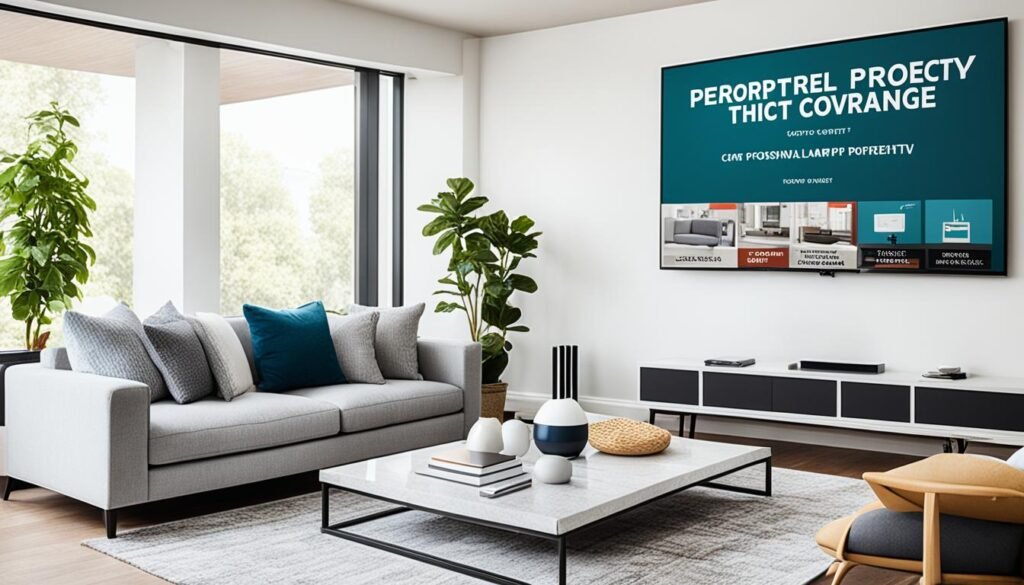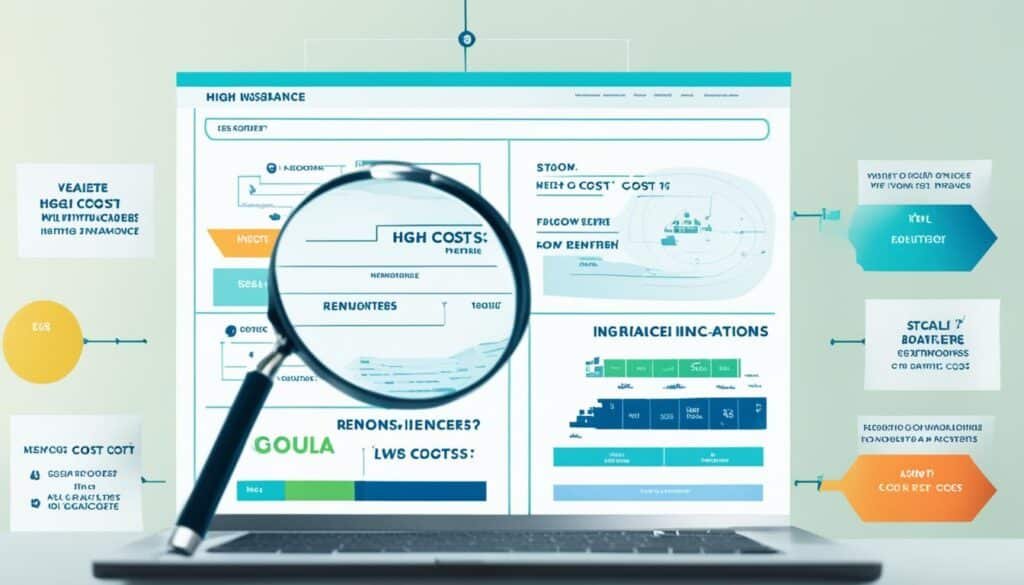Renters insurance is key for those who rent homes. It protects your things and helps if someone gets hurt or their property is damaged because of you. Your landlord’s insurance only covers the building, renters insurance focuses on your belongings and provides extra financial safety.
Renters insurance steps in when your things face a bad situation. If your items are harmed or taken in a fire, theft, or vandalism, you’re covered. It includes stuff like furniture, electronics, clothes, and jewelry. You’ll get money to replace these items, within what your policy allows, after paying the deductible.
If something happens and you can’t live in your rented home, renters insurance helps here too. It pays for your hotel, food, and other needs while your place is fixed or found anew.
Renters insurance also protects you in case someone gets hurt at your place or if you damage their property. It covers legal costs and any damages, but only up to the policy’s limits.
Key Takeaways
- Renters insurance covers your personal belongings, including furniture, electronics, and clothing, if they are damaged, destroyed, or stolen due to a covered peril.
- Renters insurance can provide reimbursement for additional living expenses if a covered event makes your rental home uninhabitable.
- Renters insurance includes personal liability coverage, which can protect you if someone is injured on your rental property or if you accidentally damage someone else’s property.
- Renters insurance does not cover the actual structure of the rental property, as that is the responsibility of the landlord.
- Renters insurance can provide valuable financial protection for renters, even though it is not legally required in most cases.
Introduction to Renters Insurance
Renters insurance is vital for people who lease their space, be it an apartment, home, or dorm. It covers your personal stuff and provides liability protection. If someone gets hurt on your property, this policy has your back. It prevents major losses and lets you truly enjoy your rental home.
Definition and Importance
This insurance covers your items from theft, damage, or other accidents. Landlord’s insurance doesn’t include your personal stuff like furniture or gadgets. Renter’s insurance steps in to pay for replacements if these things get ruined or stolen.
Additionally, it offers liability coverage. This means if someone gets hurt at your place, it helps with their medical bills and any legal issues. The value of Renters insurance is huge. It protects your finances from various unforeseen events.
“Renters insurance is a crucial financial safeguard for individuals who rent their living space, whether it’s an apartment, a house, or a dorm room.”
The coverage and cost of Renters insurance depend on many factors. These include your location, the property type, and the needed coverage. Read your policy thoroughly to make sure it meets your requirements for protection.
Personal Property Coverage

Renters insurance is a big deal, especially for your stuff. It covers your personal belongings. This includes items lost or stolen from your car or while you’re traveling. The policy takes care of losses such as theft, fire, smoke, vandalism, and some water damage, but not floods.
But, there’s a catch. Policies have a limit on how much they pay. This is the most the insurance company will pay, even if it’s not enough to replace your item. Also, keep in mind that some stuff, like cash and jewelry, might have lower coverage limits.
Covered Perils and Exclusions
Renters insurance protects you from various risks. It covers you if your stuff is lost or damaged due to fire, smoke, theft, or vandalism. However, it doesn’t usually cover flood damage. For floods, you’d need to get a special flood insurance policy.
Replacement Cost vs. Actual Cash Value
There are two main ways a policy might pay you if your things are damaged or stolen. One is replacement cost. This means the policy would pay for a new, similar item. The other option is actual cash value. This pays out the item’s value after factoring in depreciation. While actual cash value is cheaper, replacement cost is better at ensuring you can replace your belongings fully.
| Coverage Type | Description | Payout Calculation |
|---|---|---|
| Replacement Cost | Pays to replace your items with new ones of similar kind and quality | The cost to replace the item with a new one of similar kind and quality |
| Actual Cash Value | Pays the depreciated value of your items | The cost to replace the item, minus depreciation based on its age and condition |
It’s crucial to know what your insurance covers. This ensures the right protection for your belongings in case something happens.
Additional Living Expenses

Renters insurance helps if you have to move out because of a covered loss. This additional living expenses coverage can pay for extra costs. It’s known as loss of use.
If your rental gets damaged by a fire or natural disaster, renters insurance might help. It pays for living somewhere else. Expenses like hotel stays, eating out, and taking care of clothes may be covered.
- Hotel or temporary housing
- Restaurant meals and takeout
- Laundry services
- Storage fees for personal belongings
- Additional transportation costs
The amount renters insurance pays for additional living expenses is part of your personal property coverage. Usually, it’s between 20% to 50% of what you have for your things. For example, with a $30,000 policy, you might get $6,000 to $15,000 for living expenses.
It’s true that renters insurance may cover these costs. But remember, there could be rules about what is or isn’t paid for. All the details are in your policy. Make sure you know what it says about covered losses and how much you can get back.
| Expense | Covered by Additional Living Expenses Coverage |
|---|---|
| Hotel or temporary housing | Yes |
| Restaurant meals and takeout | Yes |
| Laundry services | Yes |
| Storage fees for personal belongings | Yes |
| Additional transportation costs | Yes |
“Renters insurance can be a big help if you need to move out for a bit. It covers the costs of finding a new place to live and other needs. This coverage can make facing unexpected changes easier on your budget.”
Personal Liability Coverage
Renters insurance has a big part called personal liability protection. This part helps you if someone gets hurt in your rented place and sues. It covers medical costs and legal fees if you’re found at fault for injuries or damage.
Bodily Injury and Property Damage
Personal liability coverage usually includes two main things. There’s bodily injury liability that helps if a guest gets hurt and needs medical help. Then, there’s property damage liability for if you damage someone else’s stuff accidentally.
Imagine a guest slips in your kitchen, breaking a bone. Your policy helps with their medical costs. Or you break your neighbor’s vase by mistake. Your policy might pay for a new one.
This coverage is important. It keeps you from huge costs if something bad happens in your home. Without it, you could be facing expensive medical bills or lawsuits that harm your finances.
| Coverage Type | What It Covers |
|---|---|
| Bodily Injury Liability | Medical expenses if a guest is injured in your rental |
| Property Damage Liability | Costs to repair or replace someone else’s damaged property |
With personal liability in your renters insurance, you’re shielded. It helps deal with costs from accidents or damage at home.
Renters Insurance

Renters insurance is key for people who rent their homes. It covers your things, living costs if you can’t stay there, and liability. This keeps you safe in hard times. It’s good to know it doesn’t cover the place itself; that’s on the landlord.
Even if the landlord doesn’t ask, getting renters insurance is smart. It saves your money on things like electronics, furniture, and clothing. If they’re damaged or stolen by fire, smoke, or vandalism, this insurance steps in.
| Coverage | Description |
|---|---|
| Personal Property | Covers the cost of replacing your personal belongings if they are stolen, damaged, or destroyed due to covered perils. |
| Additional Living Expenses | Provides reimbursement for temporary living expenses, such as hotel stays or meals, if your rental unit becomes uninhabitable due to a covered event. |
| Personal Liability | Protects you from legal liability if someone is injured or their property is damaged while on your rented premises. |
Having a renters insurance policy is a smart move. It protects your money and gives you peace of mind. No matter if you’re starting out or have rented for a while, renters insurance is both smart and affordable.
“Renters insurance is an essential protection for anyone who rents their living space. It’s a small price to pay for the peace of mind and financial security it provides.”
Factors Affecting Renters Insurance Cost

Many things can change the cost of renters insurance. By knowing these, you can pick the best, affordable policy for you.
Location and Crime Rate
Where your rental home is matters a lot in renters insurance cost. Places with more crimes might have higher prices. This is because the insurance company thinks there’s a bigger risk of theft or damage. But, if your home is in a safer area, prices might be lower.
Coverage Limits and Deductibles
Deciding how much coverage you want is key. More coverage means a higher price. But, you can lower your cost by picking a higher deductible. It’s all about balancing what you get with what you can afford.
| Factor | Impact on Renters Insurance Cost |
|---|---|
| Location and Crime Rate | More crimes mean you might pay more for renters insurance. |
| Coverage Limits | Bigger personal and liability coverage means higher renters insurance prices. |
| Deductible | A higher deductible can make your renters insurance cheaper. |
To get the best deal, think about these points while getting renters insurance. Fit the policy to your lifestyle and budget.
Landlord Requirements
Renters insurance is usually not a must, but some landlords ask for it. They want to make sure they’re covered if the rental gets damaged or someone gets hurt. So, if your landlord requires renters insurance, you need to show proof of insurance before moving in or signing any papers.
Your landlord might have a list of things your renters insurance must cover. They could say how much coverage you need, what your plan’s deductible should be, or which insurer to use. Always check your lease or talk to your landlord to know exactly what they want.
Before moving in, you’ll need to show you’ve got renters insurance. Sharing your policy details or a certificate with your landlord is how you do it. This helps prove you’re prepared to protect not just your stuff, but also your landlord’s property.
Meeting your landlord’s insurance needs is key to getting the rental. If you don’t comply, you might lose your chance to live there. Make sure to get the right insurance and to know what your landlord expects before you agree to rent.
“Renters insurance is a smart investment that can provide peace of mind and financial protection for both tenants and landlords.”
Exclusions and Limitations
It’s key to know what your renters insurance doesn’t cover. Commonly, it doesn’t protect against flood or earthquake damage. You may need to buy extra insurance for these.
Your renters insurance also won’t insure the place you’re renting. That’s up to the landlord. Make sure to read your policy. It tells you what is and isn’t covered. This can vary by insurance company.
Flood and Earthquake Coverage
Floods and earthquakes are usually not in a renters insurance policy. If you’re in an area where these occur, consider getting extra policy coverage. This will protect your stuff.
- Renters insurance often doesn’t cover floods or earthquakes.
- You need a different policy for floods or earthquakes.
- The building is the landlord’s responsibility regarding insurance, not yours.
Knowing the limits of your renters insurance is crucial. Check your policy. You might want more coverage for certain risks. This can help protect your things and money better.
“Renters insurance is good for personal belongings, but it’s not always enough. Knowing what isn’t covered helps make sure you’re really protected.”
Filing a Claim
When you file a renters insurance claim, the key is having the right documents. This is vital whether you’ve had a theft, fire, or another issue. Filing a claim helps cover your losses and move forward.
Documentation and Process
For a successful claim, show your insurance company evidence of your loss. You usually need to show:
- Proof of ownership (like receipts and photos) for stolen or damaged items
- A detailed home inventory showing your belongings and their values
- Photos or videos of the damage or missing items, if you have them
- Copies of any police reports or official documentation
After you have your documentation, an adjuster might check the damage. They’ll then figure out how much your claim is worth. Your insurance will work with you to decide the right compensation. This could mean they repair or replace your things, or they help with extra living costs if your home isn’t safe.
Keep things smooth by knowing the procedures and giving all documents needed. This way, your renters insurance can give you the best help.
“The key to a successful renters insurance claim is having the right documentation and evidence to support your case. Don’t be caught off guard – be prepared and stay organized.”
Tips for Choosing Renters Insurance
When picking renters insurance, it’s vital to know what you need. Start by looking at your stuff’s value, especially costly or precious items. This helps figure out how much coverage you need for your personal property.
Assessing Your Needs
You should also think about liability coverage. It covers costs if someone gets hurt or their things are damaged in your home. How many people live with you and your activities affect this.
Think about getting extra living expenses coverage too. It pays for a place to stay and other costs if your place is damaged and you can’t live there. This could be due to a fire or something like a natural disaster.
Comparing Quotes and Policies
After you know what you need, compare renters insurance options from several companies. Look for options like how they handle replacing your things, guard against identity theft, and offers for saving money.
Always check what each policy offers, its deductibles, and any things it doesn’t cover. This helps you pick the right renters insurance for what you need and can pay for.
Remember, comparing different offers and coverage options is key. This step ensures you get a good renters insurance deal that safeguards your rented space and belongings.
Also Read: What Are The Benefits Of Term Life Insurance?
Conclusion
Renters insurance is important for people who rent their homes. It covers belongings, liability, and living expenses if something happens. This insurance keeps your things safe and gives you peace of mind.
When thinking about renters insurance, consider what you need. It ensures your things are safe and protects you if someone gets hurt in your home. This makes sure renting is easy and worry-free.
With insurance, you know you’re covered if something bad happens. You can enjoy your rental more, knowing you won’t face huge costs. Remember what to look for and how to choose the best policy for you.
FAQs
Q: What does renters insurance typically cover?
A: Renters insurance typically covers personal property protection, liability coverage, and additional living expenses in case your rental becomes uninhabitable.
Q: Do I need renters insurance?
A: While renters insurance is not required by law, it is highly recommended to protect your personal belongings and provide liability coverage in case of accidents.
Q: How can I get a renters insurance quote?
A: You can get a renters insurance quote online or by contacting an insurance agency for more information.
Q: What discounts are available for renters insurance?
A: Renters insurance discounts may vary by insurance company, but common discounts include bundling with auto insurance, installing security systems, or being a nonsmoker.
Q: Does renters insurance cover my car or auto insurance?
A: No, renters insurance typically does not cover vehicles. You would need a separate auto insurance policy to cover your car.
Q: How much coverage do I need for renters insurance?
A: The amount of coverage needed for renters insurance depends on the value of your personal belongings and your liability risk. It’s important to review your assets and discuss with an insurance agent to determine the right amount of coverage.
Q: Can renters insurance help with replacement cost coverage?
A: Yes, renters insurance can provide coverage for the replacement cost of your personal belongings in case of damage or loss, depending on your policy.
Source Links
- https://www.progressive.com/answers/renters-101/
- https://www.tdi.texas.gov/tips/renters-insurance.html
- https://www.nationwide.com/personal/insurance/renters/pages/coverage

